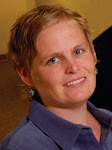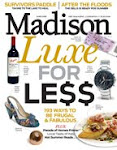 I hate that saying about how nice guys finish last. I don’t believe it. I just think they have to wait patiently while the mean guys do each other in. Not only is Kevin Hughes one of the nicest guys I’ve never met, he waited forever to find a publisher for his second novel, Casualty Crossing (StoneGarden.net Publishing, $14.95). And then he waited even longer for me to write about it.
I hate that saying about how nice guys finish last. I don’t believe it. I just think they have to wait patiently while the mean guys do each other in. Not only is Kevin Hughes one of the nicest guys I’ve never met, he waited forever to find a publisher for his second novel, Casualty Crossing (StoneGarden.net Publishing, $14.95). And then he waited even longer for me to write about it.A few years back Hughes’ day job as a Dane County Sheriff’s Office detective inspired his night job as a writer of detective novels. Hughes’ characters are so well developed, and his plots so interesting that it’s easy to lose yourself in one of his mysteries. He’s a thoughtful and conscientious guy, and his books reflect not only his passion for his career but his optimistic outlook on life—remarkable given his line of work. You’d think after more than thirty years investigating crimes a person could get a little jaded. His main character Toby Jenkins sure does.
Now Hughes is hard at work on his third book, a sequel to Casualty Crossing, and he says the fourth is slowly materializing in his head.
I talked to Hughes about his books, his job, and while I was at it, I threw him some tough questions about Madison and whether or not it’s a safe place to live anymore. Hughes was decent enough to answer them, proving once again my theory about nice guys.
What did you learn from your first novel, Just Another Shade of Blue, that helped you in crafting Casualty Crossing?
After I had written Just Another Shade of Blue, I enrolled in a writer’s course in which I was paired with a novelist who was also a former staff editor for the New York Times. This one-on-one training afforded me some valuable insight into what makes a novel tick. By using chapters from Blue I was able to see how certain applications can make your characters and plot much more believable. I ended up reworking Blue based on his teachings and was happy with the results.
I applied the techniques to Casualty Crossing from its onset and as a result, the methodology proved to be quite successful. One of the most important things I learned is that a good editor can make a huge difference in your final product.
Your characters have so much depth. They could jump off the page and start walking around. They’re very real. I imagine your ability to get inside people’s heads is what makes you such a good detective. Also, I loved the Madison references—dinner at Paisan’s, the construction of the new Dane County Courthouse, the lakes, politics. Did you have to think about basing the story in Madison with the kind of work you do?
What I do for a living didn’t enter into my decision-making process too much. My trepidation was rewriting the complete novel only to find the change of milieu was a poor choice. Once I worked on a few chapters, it was obvious to me that the story was meant for Madison and not in a fictitious city in Ohio.
The transition allowed me to bring TJ and the other characters alive in a setting that was familiar to me, which fortified the sense of place that plays such an important role in a novel. The added bonus was the opportunity to share my perspective of Madison with the reader.
At times the crime, in particular the brutal rape of the woman, which led to Toby’s courtroom outburst and suspension, felt more real because you situated it in the city in areas I’m very familiar with. It was a bit of a harsh reminder that bad people are out there doing bad things. The spate of recent murders here not withstanding, most of us feel pretty safe.
When I was a kid, I could hardly wait to grow up because I thought life would be so much easier. And back in those same old days, Madison and Dane County were growing up with perhaps the same expectations as a kid. And, we both are still learning that be it a kid or a city, growing up isn’t all it’s cracked up to be.
As Madison continues to mature, the challenges of the community increase and one of those challenges is crime. All of us bear the responsibility to keep our cities and towns safe but in the process, we must not fall victim to the fear of crime to a point that it causes us to alter our lifestyle in a drastic fashion.
Wherever you are, no matter what time of day, you must be aware of your environment and digest what is occurring in your vicinity. I’ve lived by a rule that has saved me more times than embarrassed me, which is to follow my gut instinct. The rule should apply to everyone: if you think something is amiss, you are more than likely correct and you should act accordingly. Don’t live with the regret that you could have helped mitigate a terrible incident if you’d only made a call or written down a license number.
Madison is facing issues that have impacted other medium-sized cities, some of which are dealing with the issues quite well and others that have fallen into the abyss of hopelessness. It is expensive to run a city, village, township or a county. Residents must decide where their tax dollars are spent and inform their elected officials. Our representatives are charged with moving their constituents’ agenda forward. But in order for our politicians to act on our behalf, we all must make an effort to inform them of our priorities so they can make the correct decisions regarding public policy.
Regarding the unsolved crimes in Madison, I’ve said it before and I’ll say it again: Madison is fortunate to have such a competent, talented and professional police force. I know that the police are putting forth a great effort to solve pending cases and are committed to locating and charging the person or persons involved for their actions.
Do you share some of main character TJ’s frustrations with the court system, about how sometimes the very same rules that can save an innocent person can also free a criminal? Justice isn’t always served.
Okay, TJ is a fictional character so he’s on his own on this one. As for me, I hold Dane County and Western Federal District juries in high esteem. I have learned that when those twelve to sixteen jurors sit in that box, they are attentive, intuitive and most of the time render what I believe is the correct verdict based on the facts of the case and information that the court allows them to consider.
What do you love most about writing? I love the creativity of fiction, which is my forte for now. When I’m in the writing phase of a project, oftentimes the characters will highjack the plot and, although this might sound a little odd, I let it happen because I become curious as to where they will end up, which can be quite different than my original concept.
I was amazed by your level of detail. You describe every scene right down to the pattern on the couch. I imagine that’s the kind of trait good detectives must have in order to solve crimes.
My writing technique is somewhat based on the reports I’ve prepared regarding investigations during my career in law enforcement. Prosecutors are very fond of the minutia of a case and I strive to include as much detail as possible to convey the situation as well as the perspective of the victim, witnesses and suspects. Based on that experience, I believe an author should never fake the details of a procedure. Doing so demonstrates lack of respect toward the reader.
Some of the scenes involving Billy’s abuse at the hands of his stepfather are pretty graphic. They were hard to read. What was it like writing them, or had you seen it all before combing through police reports so it was easier to write?
In spite of my experience with abuse victims, I still had difficulty writing the abuse scenes. I honestly thought I had toned down the brutality, but I also knew I had to convey the message of the hell-on-earth lifestyle that so many children must endure. Among the investigations I’ve worked, abuse cases have been some of the toughest and most rewarding of my career. There were not always happy endings, but I always felt that if my actions changed the course of a child’s life I had made an impact on the world.
How do you emotionally detach yourself from the tragic side of your work?
I spent nearly two hours trying to answer this question when I finally realized it could all be summed up in one succinct paragraph: What works for me is to understand that I do not work in the real world. The real world has much more good than evil or we’d really be in trouble.
Who are your favorite fictional detectives?
My all-time favorite was Lenny Briscoe of the old Law & Order shows (I loved his attitude and cheap suits); Harry Bosch, the protagonist in the series by Michael Connelly; Matthew Scudder, the police detective turned private eye in the Lawrence Block series and the list would not be complete without Andy Sipowicz of NYPD Blue—I’ve never met a cop who didn’t love his character.
Are you a patron of the Madison bookstore Booked for Murder?
Uh-oh, not really. I sent an e-mail and dropped off a sell sheet asking them to carry CC, but I don’t think it happened. I’ve been thinking that I might just drop of a copy for the owner and see if reading it will prompt her to stock some copies in her store.
What made you decide on a sequel to Casualty Crossing as opposed to a whole new plot, and can you give us a sneak peek at what Toby will be up to?
Primarily because I think the characters work so well that the reader will want to keep in touch with their endeavors. And of course, I enjoy the cast and have a lot of fun hanging out with them whenever I’m in the writing or development mode.
Hmmm ... a sneak peek at [third novel] Dogging Truth ... well, I can’t give too much away because it’s somewhat based on Casualty Crossing, but here’s a clue or two: This story is based on a murder in Madison in which a deputy sheriff is the defendant. TJ’s ex-wife, Elizabeth, just can’t leave well enough alone and conjures a way for the two of them to work together on the case, which leads to a very interesting journey that involves the cast of Casualty Crossing. Dogging Truth is set to be released on May 19 and around the first of the year, I’ll share a few more details with everyone on my website. In the works is Archer, the third in the series that will be published in 2010 ... can’t offer a clue on that one because a lot of it is still in my head, which means that all bets are off on where it will end up once the characters take over the keyboard.



